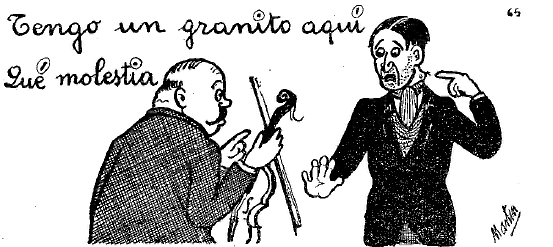
| Языки :: Испанский |
| Аудио |
 |
|
|
179 |
Español |
Spanish |
|
Lección Sesenta y cinco (65) |
||
| Un contratiempo | A mishap. | |
| 1 |
He tenido la sorpresa desagradable que yo temía, pero de un modo completamente inesperado (1). |
I have had the disagreeable surprise that I feared, but in a completely unexpected manner. |
| 2 |
Esta mañana fui a la Estación del Norte en el Metro, y presenté en la consigna el talón. |
This morning I went [was] to the North Station by [in] the tube, and presented my check at the cloak-room. |
| 3 |
Después de unos minutos volvió el empleado y me dijo : — No está el baúl, señor; no ha llegado aún (2). |
After a few minutes, the clerk came back and said to me : The trunk is not (here), sir; (it) has not arrived yet. |
| 4 |
¡Cómo, que no ha llegado! Si llegué yo hace tres días, y venia el baúl en el mismo trén. |
How ! [that] it has not arrived yet! Now, I arrived three days ago, and the trunk was coming by [in] the same train! |
| 5 | ¿Usted lo abrió en Irún para la inspección aduanera? | You opened it in Irun, for the Customs inspection? |
| 6 |
No; estaba el baúl facturado desde Paris hasta Madrid, directo, y pensé que la inspección se haría aquí, a la llegada. |
No; the trunk was registered from Paris to Madrid direct, and I thought that the inspection would take place here, at the arrival. |
| 7 |
No señor, aquí no hay Aduana. Su baúl estará detenido en Irún. |
No, sir, here there is no Custom-Office. Your trunk will be detained in Irun. |
| 8 |
Entonces, ¿qué hago yo? — Pues mande usted la llave a Irún, donde abrirán el baúl y lo expedirán (3). |
Then what do I do? — Well, send the key to Irun, where they will open the trunk and forward it. |
| 9 |
¡Qué molestia! pienso. ¿Por qué no me enteré en París? Hubiera evitado este lío (4). |
What (a) bother! Why did I not get-information in Paris? I should have avoided that trouble. |
| EJERCICIOS | EXERCISE : | |
| 1 | Dispense si le he hecho esperar, don José, me estaba afeitando. | Excuse me if I have made you wait, d. J., I was shaving [me], |
| 2 | ¡ Hombre ! soy yo él que debe de excusarse; | But my dear, it is I [I am the one] who must apologize, |
| 3 | pero siga usted aseándose, que yo no tengo prisa. | but, continue [follow] your toilet, I am not in a hurry. |
| 4 | ¡Caramba! parece que se ha cortado usted con la navaja. | By Jove! it seems (to me) that you have cut yourself with the razor. |
| 5 | No ha sido con una navaja, sino con una máquina de afeitar. | Not [it has not been] with a razor, but [if not) with a "mechanical" razor [shaving-machine], |
| 6 | ¿De las llamadas de seguridad? | (one) of those called " safety " (?) |
| 7 | Sí, tengo aquí un granito y cada vez que me afeito me lo corto; | Yes, I have a small pimple here, and every time I shave [me], I cut it [me]; |
| 8 |
pero siéntese en este sillón, y aguárdeme un momento;
estaré listo en seguida. |
but sit-down in this arm-chair and wait for me a moment; I shall be ready presently. |
| NOTES. | |
| 1 |
Temer, to fear; yo temo, usted teme, yo he temido, I fear, you fear, I have feared (regular v.). — Inesperado, unhoped for or unexpected. |
| 2 |
Volver is in the present: yo vuelvo, usted vuelve. In the preterite: yo volví, usted volvió. Progressive (or frequentative) past: yo volvía, usted volvía. — Decir, to say; yo digo, usted dice, I say, you say (present); yo dije, usted dijo, I, you said (preterite); yo decía, usted decía, I was saying (or would say), you were saying (or w. s.). Yo he dicho, I have said. |
| 3 |
Hacer, to do, to make; yo hago, usted hace, I, you do; yo hice, usted hizo, I, you did; yo hacía, usted hacía, I was doing (or would do), you were doing, etc.; yo he hecho, I have done. |
| 4 |
Enterarse, to "inform oneself", get information. — (Un lío, a go, a pretty kettle of a fish, ¡ Qué lío!, What a go! — Usted dijo, usted hizo : it is only in irreg. verbs that we find this form, in reg. verbs, the stress is on the final o : usted tomó, you took, etc... |
|
La navaja : the clasp-knife, or the razor. — EI cuchillo : table-knife, butchers knife, with fixed blade. — El cortaplumas: the penknife [cut-pens]. La silla, the chair; el sillón, the arm-chair. |
|
|
Un grano de arroz, de trigo : a grain of rice, of wheat.
— Un granito : a small grain, or a pimple. The furuncle or boil : el furúnculo. — A button (on clothes, bell) : El botón (de traje, de timbre). See less. 70, par. 3 and 4. |
